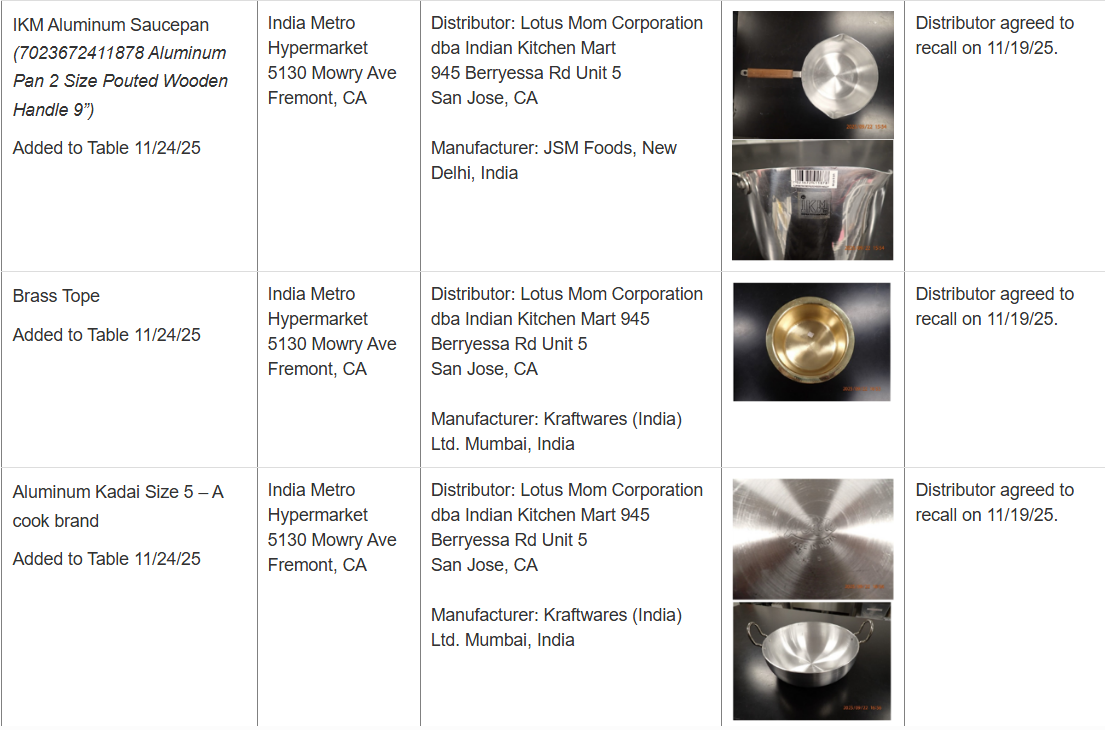- By Priyanka Koul
- Thu, 27 Nov 2025 04:57 PM (IST)
- Source:JND
The United States Food and Drug Administration (FDA) has issued a warning to consumers regarding 19 types of cookware, several of which are manufactured in India using aluminium and alloys that pose a risk of lead leaching into food, CBS reported on Thursday. The FDA specifically flagged aluminium cookware from various Indian manufacturers, stating that these "imported" items are releasing significant levels of lead (Pb) into food.
CBS's report highlighted the FDA's warning, "Consumers should be cautious of 19 types of cookware that may contain lead, increasing the risk of the toxic metal contaminating food." The agency advised consumers to check their cookware and dispose of any items that might be affected.
According to CBS, the "suspect cookware, all manufactured outside the US and mostly in India, is made from aluminium, aluminium alloys, and brass, which have been tested by the FDA and state agencies. The results showed that these materials are leaching lead into food."
The report also noted that the FDA's warning comes after an earlier alert in August, with the agency adding nine new products to its list of items to be discarded due to the risk of lead exposure. The list of flagged cookware includes various saucepans, brass pots, Kadai, and milk pots, among other items.
What Happens When You Consume Lead?
The Centres for Disease Control and Prevention (CDC) has stated that lead poisoning can cause a range of symptoms, including abdominal pain, nausea, vomiting, loss of appetite, memory loss, and tingling or pain in the hands or feet, among other health issues.
Lead is harmful to humans and can affect people of all ages and health conditions. There is no safe amount of lead exposure. Even small amounts of lead can cause significant health issues, especially for children and unborn babies. Eating food with high levels of lead can lead to elevated blood lead levels. Children and infants are particularly at risk due to their smaller size, faster metabolism, and rapid growth.
Although children may not show immediate symptoms with low exposure, they can experience developmental delays, reduced IQ, and changes in behavior. Higher levels of lead exposure can lead to fatigue, headaches, stomach aches, vomiting, and neurological issues.
The FDA also warned that women of childbearing age and breastfeeding mothers are at particular risk of lead poisoning.
ALSO READ: Caught On Camera: Woman Attacked By Pet Dog In Rajkot; Owner Slaps Victim Instead Of Helping
CBS reported that the affected cookware was being sold by several retailers in states such as California, Illinois, Maryland, New Jersey, New York, and Washington, DC. The FDA has provided a list of the Indian manufacturers flagged for their products.

'We Don't Trust What America Says': Indian Traders
Indian traders have expressed their views on the issue. One utensil trader commented: "Aluminium has been used in every household for years. We will continue using it unless the Indian government issues an advisory. If they ban it, we will accept it, but until then, we don't trust what America says. This is part of a trade war to suppress Indian products."
#WATCH | Jharsuguda, Odisha: CBS reported, America’s FDA is warning consumers about 19 types of cookware, made in India out of aluminium and alloys, that risk leaching of lead into food. A utensil trader says, "Aluminium has been used in every household for years... We will use… pic.twitter.com/ds7gy7FLza
— ANI (@ANI) November 27, 2025
Another trader added: "I've been using these items for years without any problems. Why is this suddenly an issue now that the Americans have raised their concerns? There has been no such research in India."
#WATCH | Jharsuguda, Odisha: CBS reported, America’s FDA is warning consumers about 19 types of cookware, made in India out of aluminium and alloys, that risk leaching of lead into food. A utensil trader says, "...I have been using it for so many years and never faced any… pic.twitter.com/uNDO6A70oh
— ANI (@ANI) November 27, 2025
The FDA has urged retailers and distributors to contact the agency with any questions regarding the safety and regulatory status of any products they sell for food preparation.

